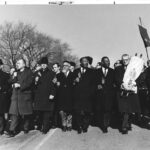Rabbi Mark Borovitz
I 'met' Rabbi Heschel in 1987, when the prison rabbi where I was incarcerated, Rabbi Mel Silverman, introduced me.
Rabbi Emeritus, Beit T’shuvah
California
A Jewish Perspective
Transcribed from an Interview
I “met” Rabbi Heschel in 1987, when the prison rabbi where I was incarcerated, Rabbi Mel Silverman, introduced me to him through the Carl Stern interview. I immediately knew that Rabbi Heschel understood me and knew me in ways I hadn't even realized that I didn't know myself. That began 36 years of learning, immersing myself, and listening to the words of Rabbi Heschel. I was introduced to Rabbi Heschel at a moment when I was desperate and willing to change my life. I changed everything about myself. I got out of prison, and I finished my undergraduate degree in 1995.
In the Garden of Eden story, where it says, “God calls Adam and Adam hid.” By immersing myself in Torah, I realized how many times God had been calling me throughout my life. I sat in my prison cell and cried like a baby. That was the beginning of my relationship with Rabbi Heschel. When I was released, I was able to work at Beit T’shevua, a non-sectarian, Jewish-based residential recovery center in Los Angeles. I began leading Shabbat services and doing Torah study. I led an ethics group using Pirkei Avot and Rabbi Heschel. Rabbi Heschel informed everything I did, which led me to rabbinic school.
After I was ordained from American Jewish University, I became the rabbi of Bet Teshuva, and we had a Heschel group that met every week for people in recovery. Pieces of Rabbi Heschel helped and impacted their recovery. Rabbi Heschel was talking about the recovery of our soul, the recovery of our essence, the recovery of the self we were created to be, in the words of Thomas Merton.
Every Friday night when I would do services, I would begin the service with an opening quote from Rabbi Heschel. Rabbi Heschel’s writing is deeply connected to God. People experiencing addiction who can’t believe or whose belief in God was stunted need to have a belief in a greater power to get beyond their self-centeredness and the selfishness of addiction.
He was a visionary. I look to his 1971 essay, “In Search of Exultation,” where Heschel wrote about the challenge of drug addiction:
We have a major curse in American today, the epidemic of drug addiction. Sometimes I have a strange feeling that this problem may be a blessing in the form of a curse. Perhaps this will wake us up to discover that we have gone the wrong way.
Rabbi Heschel, for me, always went to the core of the problem, and the core is always inside humans. His main teaching for me is radical amazement; the greatest hindrance to knowledge is our adjustment to conventional notions and mental clichés. Every day, I close my eyes and open them up again to see the world anew.

